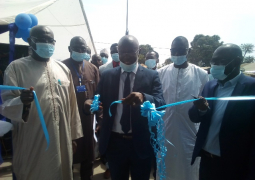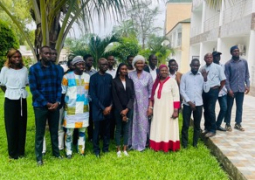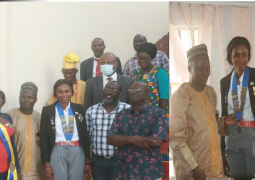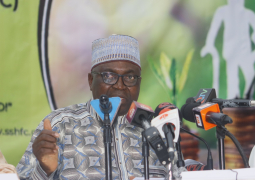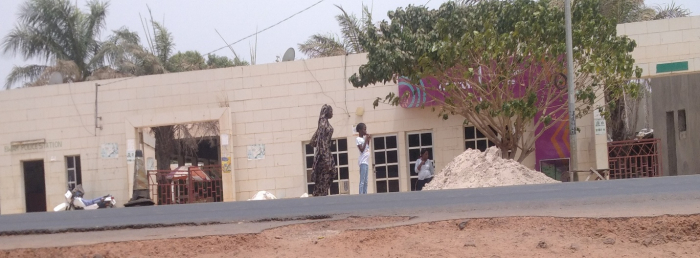
Bwiam is located in Foni Kansala District, West Coast Region of The Gambia.
Isatou Giya Colley, a woman community leader and vendor at Bwiam Market, said their progress has been a setback, adding that they were not able to sell normally during hours.
In The Gambia, markets closed as early as at 1 p.m. and were not allowed to sell on Sundays, bring a lot of difficulties.
“We really suffered during this time because a lot of us earn our living from the market. We sell our products and go back home to feed our families and hence we were forced to close by 1 p.m. and would not sell on Sundays, we had great difficulties sustaining our needs,” she stated.
“We could not buy goods at our liberty because of the Covid-19 restrictions; and increment of fares,” she said. “We had a lot of constraints. We could not have what we were supposed to have, we had only suffered.”
“Even our feeding was a big problem. Most of us went to bed without dinner during the pandemic due to Covid-19 market restrictions because we depend on the market to feed our families,” she stated.
However, she pointed out that the government should have intervened and helped market women. “Because if you ask someone whose source of income is to sell and feed themselves to sit at home, how would you expect them to survive?”
“They should have given people something to hold on to feed themselves and their families after placing restrictions on citizens,” Giya Colley queried.
A dry fish vendor, who spoke to our reporter on the condition of animosity, said she was not able to go and buy goods during the restrictions. “I was afraid to go to the river to find fish and that was how I used to feed my family and solve other needs. It was very difficult for us.”
“I didn’t have any goods to sell. I sat for weeks without going to the market because I didn’t have anything to sell,” she also said.
“The market was my only source of income. Feeding was a problem. If you are used to working to satisfy the needs of your family and you cannot work anymore, of course it would be difficult. But we just had to bear,” she further said.
She added: “We ate whatever we had. I planted some groundnuts last year. So we pounded the peanut to cook “mbahal” or “domada (local made foods) or we put jumbo in the rice if we had nothing to eat,” she said further.
“I used to stay for close to a month without going to buy goods because I wanted to ensure that I protect myself and my family.”
The fares were very expensive too; as they were increased from the normal D45 tariff to D100 – the from Bwiam to Brikama, she went on, adding that this really affected her business as she buys her goods mostly from Sanyang, a peri-urban coastal in West Coast Region.
Maram Touray owns a shop at the market, and she said the pandemic brought a lot of difficulties. She added that she faces a lot of suffering due to the virus.
“I used to sell bowls, shoes, and second hand clothings at the market. But with the coming up of the Covid-19, our shops were closed completely. They asked us not to sell our goods and that affected my financial situation,” she stated.
“My goods were spoiled because shops were closed for months and my shop was leaking.”
According to her, the pandemic made life difficult for her and her family especially when it comes to feeding.
She appealed to the government to support people in order to improve their living status.
Health service least affected

Dr. Kitabu Jammeh, a medical officer at the Bwiam General Hospital, said nothing changed in the aspect of health care in the hospital.
He said all out patient service points, medical emergency, and surgical emergency services have all not been interrupted by the pandemic.
“When it comes to healthcare services for women and children, all service points are functional. There was no lapse in anything. No human resource gap or resources challenge were experienced, according to Dr. Jammeh.
However, he said, there was a time when getting supply from the Central Medical store was a challenge for the hospital but then, the hospital stepped in.
Jarra Jarju, a patient at the Bwiam general hospital said: “When we come here to seek health care services, we are not allowed to enter the hospital without a mask. They asked us to go out and buy a mask and if we had not come with the money to buy a mask, we would suffer because we would either go back home or look for money to buy one.”
“Although we used to have proper medical care when we got in, sometimes we are asked to buy some of the medicines at the pharmacy. The government should help with the necessary materials so that health personnel can help us with the health care service we need,” she said.
Jarra, a four-month-old pregnant woman added that she finds it difficult to do an ultrasound test due to poor financial situation caused by the Covid-19 pandemic. “I am a school market vendor, and for months that the schools were closed, I couldn’t sell and feeding was always a problem because my financial status was affected.”
Philip Bass, principal at Fatima Senior Secondary School at Bwiam, said the pandemic has affected students’ performance significantly considering the closure of schools for six to seven months.
He said due to the pandemic, the school is forced to go into double shift because they needed to adhere to the Covid-19 physical distancing guidelines.
Bass said as a result of the pandemic, his school had to reduce activities and interactions with students.
“We used to have a creation week, a week that is specifically designed for students to showcase their talents in poetry, drama, miming and sports. But because of the Covid-19, we had to do away with the creation week,” he said.
Isatou Giya Colley, a parent, said the Covid-19 affected their children’s education especially those in the examination year, adding that the pandemic would drastically reduce students’ performance.


